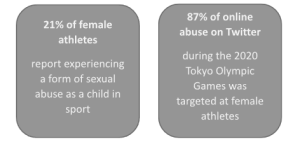Towards a Safer Future: Goals and Vision for Sport GVP

Introduction
Violence against women and girls does not exist in a vacuum. It is rooted in structural inequalities and discrimination; it is rooted in toxic social norms; and it is rooted in harmful masculinities — harmful to women, harmful to men, and costly for all of society.
Gabriela Ramos
Assistant Director-General for Social and Human Sciences of UNESCO
The world of sports, known for its power to unite, inspire, and uplift communities, has unfortunately been marred by instances of gender-based violence (GBV). From harassment and discrimination to physical and sexual assault, athletes, coaches, and staff have experienced several harmful behaviours. These actions not only cause immense harm to individuals but also erode the core values of sportsmanship, respect, and integrity. It is imperative to recognise that GBV undermines the integrity of sports, hinders the potential of athletes, and perpetuates harmful societal norms.

(UNESCO, 2023)
The global sports community has an obligation to take decisive action. By addressing GBV with urgency and commitment, we can harness the transformative power of sports to create safer, more inclusive environments where everyone can feel included and succeed.
The Issue of GBV in Sports
GBV in sports manifests in various forms, including among others:
- Sexual harassment
- Sexual assault
- Emotional abuse
- Physical abuse
- Discrimination
These issues are not confined to any single level of sport; they occur in youth leagues, collegiate athletics, professional teams, and even international competitions. Often, the culture of silence, fear of retaliation, and lack of adequate policies exacerbate the problem, leaving survivors unsupported and perpetrators unaccountable.
Goals for a Safer Future
To address GBV in sports, we must establish clear, actionable goals and work collectively toward a vision of safety, equity, and inclusion. These goals include:
- Zero Tolerance for GBV
- Policy Development: Establish clear and enforceable policies and procedures to prevent, detect, and respond to GBV at all levels of sports organisations.
- Mandatory Training: Require comprehensive training for athletes, coaches, staff, and officials on recognising, addressing, and preventing GBV.
- Cultural Change: Foster an environment of respect and accountability, ensuring that all individuals feel empowered to report incidents without fear of judgment or retaliation.
- Empowering Survivors
- Support Services: Offer confidential and accessible resources, including counselling, legal aid, and medical care, tailored to the unique needs of survivors.
- Privacy Protections: Safeguard the privacy and confidentiality of victims throughout reporting, investigation, and resolution processes.
- Victims-Centred Approached: Prioritise the well-being, autonomy, and recovery of victims in all organisational responses.
- Strengthening the Knowledge Base
- Data Collection and Analysis: Collect and analyse data on GBV in sports to identify patterns, trends, and areas for intervention.
- Research and Innovation: Support research to develop evidence-based prevention and intervention strategies.
- Knowledge Sharing and Capacity Building: Facilitate knowledge sharing and capacity building among stakeholders to promote best practices and improve responses to GBV.
- Educating and Preventing GBV
- Educational Programmes: Develop and implement education initiatives for athletes, coaches, and parents on topics such as healthy relationships, consent, and respectful behaviour.
- Bystander Intervention: Encourage individuals to recognise, speak up, and act when they witness or suspect GBV, ensuring that intervention becomes a norm rather than an exception.
- Strengthening Governance and Accountability
- Independent Oversight: Establish independent bodies to oversee the enforcement of anti-GBV policies, ensuring transparency and fairness.
- Reporting Mechanisms: Create user-friendly, anonymous, and accessible platforms for reporting GBV incidents.
- Accountability Measures: Investigate all allegations of GBV promptly and thoroughly, holding perpetrators accountable through disciplinary actions and, when necessary, legal consequences.
A Vision for the Future
Our vision for the future of sports is one where every individual, regardless of gender, can participate and succeed in a safe, equitable, and inclusive environment. By fostering respect, accountability, and education, we can eradicate GBV from the sports world and replace it with a culture that uplifts and empowers everyone involved.
This vision requires a unified effort. Sports organisations, governing bodies, policymakers, educators, and athletes all play a crucial role in driving this change. Collaboration across these sectors can lead to transformative practices and policies that ensure no one is left behind.
Conclusion
Addressing GBV in sports is not just a moral imperative but a necessary step to protect the integrity and transformative potential of sports. By prioritising prevention, survivor support, and accountability, we can build a future where sports truly reflect the best of humanity: fairness, respect, and unity.
Next Steps
To further advance our efforts in preventing and tackling GBV in sports, the following initiatives will be implemented by the Sport GVP consortium:
- Training Package: Development of a comprehensive training package focused on preventing and tackling GBV in and through sport.
- Gamified eLearning Platform: Launch of an interactive, gamified eLearning platform designed to educate stakeholders on GBV prevention.
- Info Days: Organisation of awareness-raising Info Days in Greece, Cyprus, Italy, and North Macedonia to engage local communities and stakeholders.
- Final Conference: A concluding conference in Denmark to share insights, best practices, and project outcomes, fostering collaboration and future initiatives.
Reference
UNESCO. (2023). Tackling violence against women and girls in sport: a handbook for policy makers and sports practitioners. UNESCO. https://unesdoc.unesco.org/ark:/48223/pf0000386159